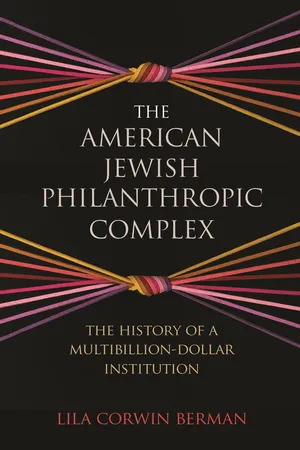
The American Jewish Philanthropic Complex
The History of a Multibillion-Dollar Institution
- English
- ePUB (mobile friendly)
- Available on iOS & Android
The American Jewish Philanthropic Complex
The History of a Multibillion-Dollar Institution
About This Book
The first comprehensive history of American Jewish philanthropy and its influence on democracy and capitalism For years, American Jewish philanthropy has been celebrated as the proudest product of Jewish endeavors in the United States, its virtues extending from the local to the global, the Jewish to the non-Jewish, and modest donations to vast endowments. Yet, as Lila Corwin Berman illuminates in The American Jewish Philanthropic Complex, the history of American Jewish philanthropy reveals the far more complicated reality of changing and uneasy relationships among philanthropy, democracy, and capitalism.With a fresh eye and lucid prose, and relying on previously untapped sources, Berman shows that from its nineteenth-century roots to its apex in the late twentieth century, the American Jewish philanthropic complex tied Jewish institutions to the American state. The government's regulatory efforts—most importantly, tax policies—situated philanthropy at the core of its experiments to maintain the public good without trammeling on the private freedoms of individuals. Jewish philanthropic institutions and leaders gained financial strength, political influence, and state protections within this framework. However, over time, the vast inequalities in resource distribution that marked American state policy became inseparable from philanthropic practice. By the turn of the millennium, Jewish philanthropic institutions reflected the state's growing investment in capitalism against democratic interests. But well before that, Jewish philanthropy had already entered into a tight relationship with the governing forces of American life, reinforcing and even transforming the nation's laws and policies. The American Jewish Philanthropic Complex uncovers how capitalism and private interests came to command authority over the public good, in Jewish life and beyond.
Frequently asked questions
Information
Table of contents
- Cover Page
- Title Page
- Copyright Page
- Contents
- Introduction: The State of Philanthropy
- 1. Associations
- 2. Regulations
- 3. Property
- 4. Taxation
- 5. Politics
- 6. Finance and Identity
- 7. The Market
- 8. The Complex
- Conclusion: Reform
- Acknowledgments
- Archives and Abbreviations
- Author’s Interviews
- Notes
- Index